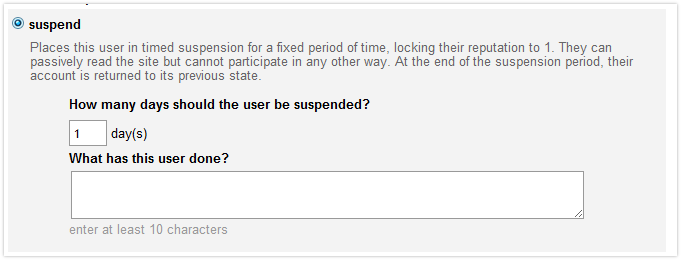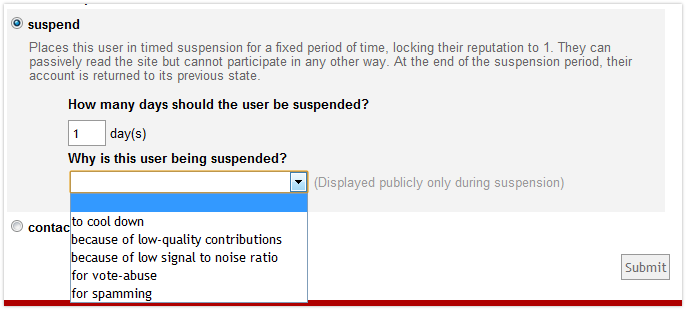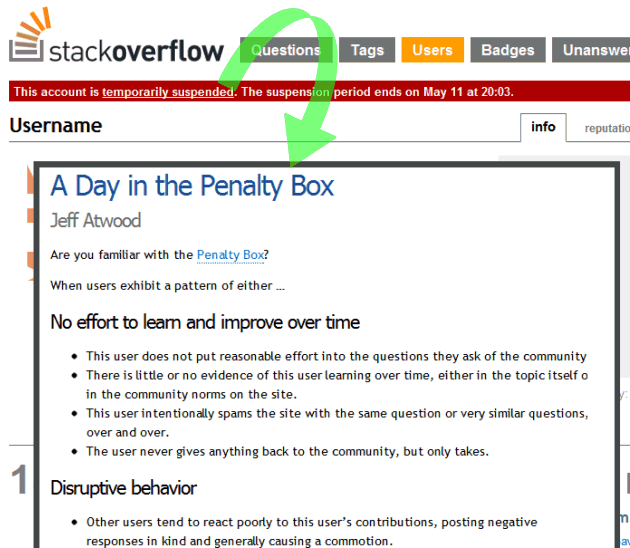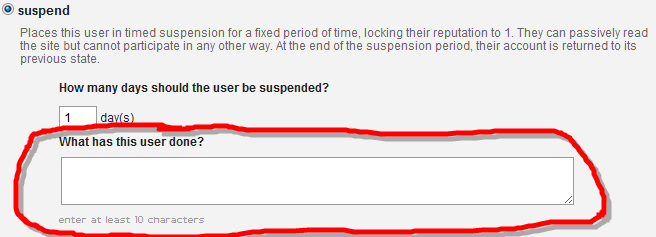This sort of thing has happened a few times now...
"Hey, did you see? User X was boxed!"
"User X? Why?"
"I donno... Maybe he... " (wild speculation ensues. waffles are blamed.)
It's generally quite easy to notice when a user gets thrown in The Penalty Box. You see the tell-tale 1 when viewing questions they've asked or answers they've provided. You visit their profile page. You see that big red message. And you're curious...
The Streisand effect is an Internet phenomenon where an attempt to censor or remove a piece of information backfires, causing the information to be widely publicized.
This isn't good. It turns what should be a subtle "cool-down" period into a big public spectacle. And for what?
Worse yet, speculation leads to unease. Was the suspension really justified? Where's the evidence? What's the definition of "jerk"?
It's been two years since this tool was introduced, and nearly a year and a half since I first wrote this proposal. In that time, a number of things have changed:
The popularity of the core "SOFU Trilogy" sites has grown immensely, bringing many more "problem users" with it.
Many new Stack Exchange 2.0 sites have been created, with community-elected and "Pro Tempore"-appointed moderators.
Moderators can now engage users in private conversations on-site, without having to resort to email. These conversations remain attached to the account, allowing other moderators to review them as-needed. Templates are provided to guide moderators in communicating common problems.
The "No effort to learn and improve over time" rationale for suspending turned out to be as or more important than "Disruptive behavior" on Stack Overflow.
In addition to this, moderators have found other uses for this tool: suspending (rather than deleting) spammer accounts to allow for tracking history and... scalp-hunting. This just goes to show, no matter how obvious the purpose of a tool might be, folks will always find other uses...
There are currently 90+ suspended users on Stack Overflow, over 40 on Super User and nearly 150 on Server Fault. In the face of this, the occasional drama resulting from the suspension of a popular/notorious user seems relatively unimportant...
But I don't think it is.
Jeff often refers to the modern-day Stack Overflow as having "big city problems", meaning it's reached a scale where the sort of intimate, hand-holding relationship between staff, moderators, and new users is no longer practical. But it also has "big city advantages" - paradoxically, you can retain some amount of privacy in a large population, while in the small town everyone knows you... In the big city, you can spend the night in jail and go back to work the next morning without any questions; in the small town, everyone remembers how you got into an argument with Barney in front of the post office last May.
SE is busily adding more small towns. Hopefully, they won't stay small very long... But that initial, small-town period is crucial to their later development. Personalities clash, users unfamiliar with the SE platform stuble through newbie mistakes with varying degrees of grace, and the newly-minted moderators try their best to gain the trust of the budding community. During this period, it is vital to avoid the appearance of censorship or abuse of power.
Transparency, when it matters
After discussing this with several moderators and watching how suspension is used in practice, I've come to the conclusion that there are two three primary categories:
Users who should be / will be deleted. Suspected spammers, trolls, sockpuppets, astroturfers, etc. There's no need to wear the kid gloves here; no positive contributions to the site, past or present.
Users who've made a disturbing mix of valuable, and harmful contributions to the site. These may need some care; poor-quality questions, rants or inflamatory comments have probably been deleted, sockpuppets have been merged, votes expunged, leaving a public record that looks pretty good to the casual observer. And others may agree with these users' arguments, even if they disagree with the tone or manner in which they've been presented. The hope is that the suspended user will come back to the site and participate positively; any appearance of public humiliation, whether by moderators or other users, works against this goal.
Users who just need a chance to cool down. This is a pretty close match to the original metaphor of a "penalty box" - a user got caught up in an argument, or came home drunk and started having some "fun" at the expense of other users, or quit smoking... Maybe their account was hacked and they can't be contacted for some reason. There's no reason they can't come back and contribute positively once they've regained their composure, but in the meanwhile they need to be kept from making a mess of the site and their own reputation.
I originally suggested a simple change: add a way for moderators to add a brief, public comment to the account, noting the reason without going into detail. "Sockpuppet voting", "Persistent low-quality", "Cool down", etc.
But that's unnecessary in the vast majority of suspensions. Indeed, even a moderator-only annotation isn't really necessary when the user is a flagrant spammer, or has already been sent a message regarding persistent abuse. The situations I wanted to address here, and still believe are worth addressing here, are the tiny handful of high-profile suspensions involving a user well-known within their site or circle, where a suspension might otherwise lead to harmful speculation.
So here's my second idea. This is what the suspension UI looks like right now:

Moderators must enter at least a short description of the problem, even if that's just "See user-message ###". The idea is that this gives other moderators a place to start when reviewing suspensions; in practice, the user's history (containing annotations, private user-messages, etc.) is probably going to contain more important information. Here's what I propose in its place:

Note that I'm not attempting to enumerate badness here, although I suppose I am stratifying it. The results would look like this:

Terse. No gory details. And without that free-form text-entry to trip up a new, frustrated moderator whose goal should be to minimize rubbernecking. And most importantly, specific enough to hopefully quell speculation until such a time as the user is able to defend himself.



